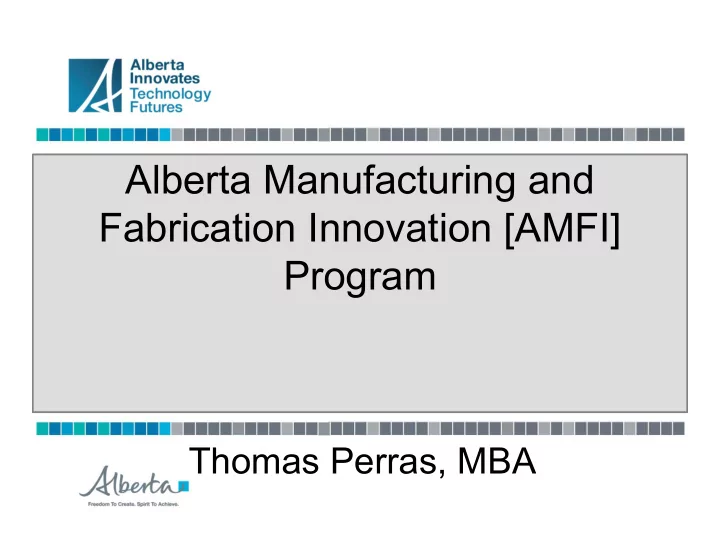

Alberta Manufacturing and Fabrication Innovation [AMFI] Program Thomas Perras, MBA
Agenda ■ Introductions to AITF ■ AMFI Background Information ■ Expanded AMFI Program ■ Program Objectives ■ Operational Plan ■ Member Benefits ■ Program Structure ■ Questions
Introduction to AITF ■ Alberta Innovates – Technology Futures (AITF) was established on Jan 1, 2010 (merger of Alberta Research Council , Alberta Ingenuity , iCore & NanoAlberta ) ■ Provincial government laboratory; offers capabilities in applied R&D, technical services & technology commercialization (scale-up) ■ Non-profit corporation funded by Gov’t of Alberta & industry ■ 600+ Employees; 5 Research Centres; ARC est. 1921 3
Introduction to AITF Edmonton Edmonton 100,000 m 2 of bench and pilot-scale facilities 1,000 industry clients per year Funding programs focused on business and talent development Regional innovation Devon networks Demonstration/Scale-up Joint Industry Projects Consulting & Testing Vegreville ‘Bringing Technology to Market’ programs
Capabilities Testing & Qualification ■ Pilot-scale slurry & oil flow loops ■ Sour testing facility, corrosion lab ■ Welding lab (high productivity systems) ■ Materials Testing (strength, impact, hardness, fatigue/creep life) ■ Durability Testing (wear, corrosion, permeability, weathering, cold/hot) ■ Performance Testing (R value, fire) ■ Metallographic & micro-analysis (optical microscopy; SEM) ■ Chemical and thermal analysis ■ Prototype testing ■ ISO quality programs 5
AMFI 1.0 Background ■ AMFI Program started in 2010 Support from IAE, WD, and University of Alberta’s CCWJ Approximately a $1.5 million dollar program Program was designed to showcase advanced welding processes to experienced professionals to increase productivity Over 200 participants over 4 years Surveys and client follow ups showed uptake of new technologies after sessions. This is a driver of current proposal. Only advanced training course of its type in Western Canada Allowed combination of hands on training and theory training Program ended March 31, 2014
What is AMFI going forward? ■ A technology transfer program designed to de-risk and screen advanced technologies for Alberta Manufacturers and Fabricators ■ Three strategic areas: Welding and Joining Coatings Inspection and NDT ■ Create training programs in conjunction with post secondary institutions Canadian Centre for Welding and Joining (U of A) Red Deer College NAIT/SAIT Other post-secondary institutions ■ New product development ■ AMFI technologies will be assessed on: Efficiency, Cost Reduction, Quality, and Safety
Value Proposition – Why Manufacturing and Fab? ■ The competitiveness of Alberta manufacturers and supply chain partners is being challenged due to productivity issues and labour shortages, while demand for industrial products and services in Alberta is at an all-time high ■ Problem expected to continue for the foreseeable future, as there is currently over $100B in new projects being planned Alberta over the next decade. ■ The metal fabrication and manufacturing sector in Alberta employs almost 60,000 people province wide, and has a payroll of approximately $3.1 billion. ■ The estimated economic impact of the industry on the provincial economy in 2013 was $30.8 billion, including direct, indirect, and induced impacts. Reference: http://www.albertacanada.com/AIS_MF_metalfab_overview.pdf
Program Objectives ■ The AMFI Program will provide Alberta manufacturers (particularly SMEs) with a dedicated program to de-risk and screen promising fabrication methods and to help develop product lines based on these technologies. ■ AMFI will promote or assist with: Improved Productivity Reduced Production Costs Increased Quality and Consistency of Products and Services Integration of New and Existing Technologies Development of New Products and Techniques Enhanced Professional Training for Skilled Labour in Conjunction with Post-Secondary Institutions Increased Safety for Workers and Reduced Environmental Impact
Operation Plan (2015-2019) 1. Technology Screening – (April to October) A. Specific Technology Selection (April to June) B. Acquisition and Installation of Equipment (July to October) 2. Technology Assessment (July to March) A. Business Case (July to October) B. Technical Assessment – Proving claims (October to February) C. Demonstration Session (Post March) D. Deployment to Industry 3. Product Development & Technology Optimization (October to completion) (1 on 1 or JIPs) A. Development with AMFI Members B. Internal AITF Development C. Academic Research D. Deployment to Industry 4. Training (On-Going) A. Negotiation of equipment transfer to Alberta post-secondary institutions B. Training courses with industry associations, post-secondary, or technical societies 10
Member Benefits ■ Leveraging of private funds with government contributions to reduce risk to Alberta companies ■ Third party screening of the most advanced technologies from equipment and consumable manufacturers and vendors ■ Technical assessments of consortium selected technologies in welding, coatings, and inspection ■ Business case creation for technology adoption and assistance in integration to current operations ■ The potential to perform ‘one-on-one’ research with AITF on consortium equipment for specific applications ■ Access to research funding from AITF and its AMFI partners ■ Networking with Alberta manufacturing, fabrication, applicator, service and supply chain companies.
AMFI Program Industry Technology Screening Technology Assessment & Gov’t Demonstration AMFI Technology Optimization & Product Development Improved AITF Deployment to Industry Productivity Post ‐ Training Secondary New Products Supply Chain Alberta Educational Institutes End Users 12
AMFI Stakeholders AITF Supply Chain Consortium Operators Post ‐ (Oil & Gas, Secondary (Fabricators, Pipeline) Institutes Applicators & Service Providers) Equipment Vendors 13
Program Structure AITF Overall program and facility management Manage equipment acquisition and material procurement Carry out research activities and formulate end products Development of enhanced training programs in conjunction with industry associations and post- secondary institutions based on AMFI assessed technologies Conduct ‘one on one’ research with consortium members Consortium members Drive research direction (yearly input into technology selection) Contribute financially through consortium membership fees Equipment and material suppliers and manufacturers Provide necessary equipment and materials for the benefit of consortium members 14 Assist research activities and training by lending expertise
QUESTIONS?
Recommend
More recommend